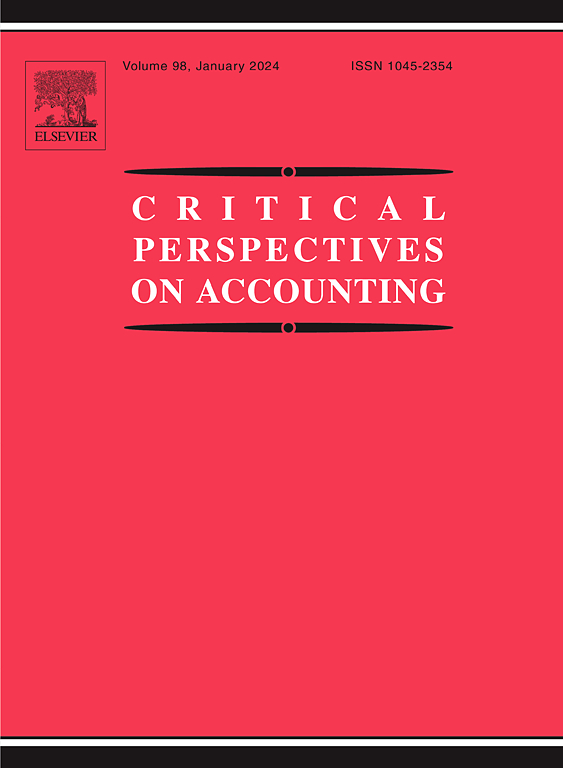(E)由市场评估:在寻求叙述权威的过程中评估卖方分析师个人表现的挑战
IF 5.7
2区 管理学
Q1 BUSINESS, FINANCE
引用次数: 0
摘要
最近,人们利用叙事权威的概念来理解金融分析师的工作,不再关注他们建议的技术内容,而是关注他们如何构建自己的合法性和话语。借助评估社会学,我们研究了用于评估卖方分析师个人表现的系统,以了解他们在叙事权威构建中的作用。本研究基于对13位金融市场专业人士的33次访谈。它详细地考察了系统所传达的卖方分析师的表现,以及分析师自己对它的看法。我们展示了他们需要如何与其他金融专业人士接触,以建立自己的叙事权威,尤其是在内部。为了理解我们揭示的动态,我们提出了一个会计系统的想法——一个绩效评估系统——它体现并“执行”市场,保持叙述权威与股票市场估值和评估之间的循环。这项研究表明,构建叙事权威是多么困难,它是多么脆弱。我们为商品化和市场化的文献做出了贡献(Çalışkan &;Callon, 2009)通过展示如何评估金融分析师的业绩定位他们在市场上的资产。最终,我们的研究表明,当经济现象由表现性叙事构建时,会计系统如何在理解经济现象方面发挥关键作用。本文章由计算机程序翻译,如有差异,请以英文原文为准。
(E)valuated by the market: The challenges of evaluating the individual performance of sell-side analysts in the quest for narrative authority
The concept of narrative authority has recently been mobilised to understand the work of financial analysts, focusing less on the technical content of their recommendations than on how they construct their legitimacy and discourse. Drawing on the sociology of evaluation, we look at systems used to evaluate the individual performance of sell-side analysts in order to understand their role in the construction of narrative authority. This study is based on 33 interviews with 13 financial market professionals. It examines in detail the representations of sell-side analysts’ performance the system conveys, as well as the analysts’ own perceptions of it. We show how they need to reach out to other financial professions in order to build their narrative authority, particularly internally. To make sense of the dynamics we unveil, we propose the idea of an accounting system—a performance evaluation system—which embodies and ‘performs’ the market, maintaining a circularity between narrative authority and stock market valuations and evaluations. The study shows just how difficult it is to construct a narrative authority and how fragile it is. We contribute to the literature on commodification and marketisation (Çalışkan & Callon, 2009) by showing how the evaluation of financial analysts’ performance positions them on the market as assets. Ultimately, our study shows how an accounting system plays a key role in understanding economic phenomena when these are constructed by performative narratives.
求助全文
通过发布文献求助,成功后即可免费获取论文全文。
去求助
来源期刊

Critical Perspectives on Accounting
BUSINESS, FINANCE-
CiteScore
9.40
自引率
7.80%
发文量
91
期刊介绍:
Critical Perspectives on Accounting aims to provide a forum for the growing number of accounting researchers and practitioners who realize that conventional theory and practice is ill-suited to the challenges of the modern environment, and that accounting practices and corporate behavior are inextricably connected with many allocative, distributive, social, and ecological problems of our era. From such concerns, a new literature is emerging that seeks to reformulate corporate, social, and political activity, and the theoretical and practical means by which we apprehend and affect that activity. Research Areas Include: • Studies involving the political economy of accounting, critical accounting, radical accounting, and accounting''s implication in the exercise of power • Financial accounting''s role in the processes of international capital formation, including its impact on stock market stability and international banking activities • Management accounting''s role in organizing the labor process • The relationship between accounting and the state in various social formations • Studies of accounting''s historical role, as a means of "remembering" the subject''s social and conflictual character • The role of accounting in establishing "real" democracy at work and other domains of life • Accounting''s adjudicative function in international exchanges, such as that of the Third World debt • Antagonisms between the social and private character of accounting, such as conflicts of interest in the audit process • The identification of new constituencies for radical and critical accounting information • Accounting''s involvement in gender and class conflicts in the workplace • The interplay between accounting, social conflict, industrialization, bureaucracy, and technocracy • Reappraisals of the role of accounting as a science and technology • Critical reviews of "useful" scientific knowledge about organizations
 求助内容:
求助内容: 应助结果提醒方式:
应助结果提醒方式:


